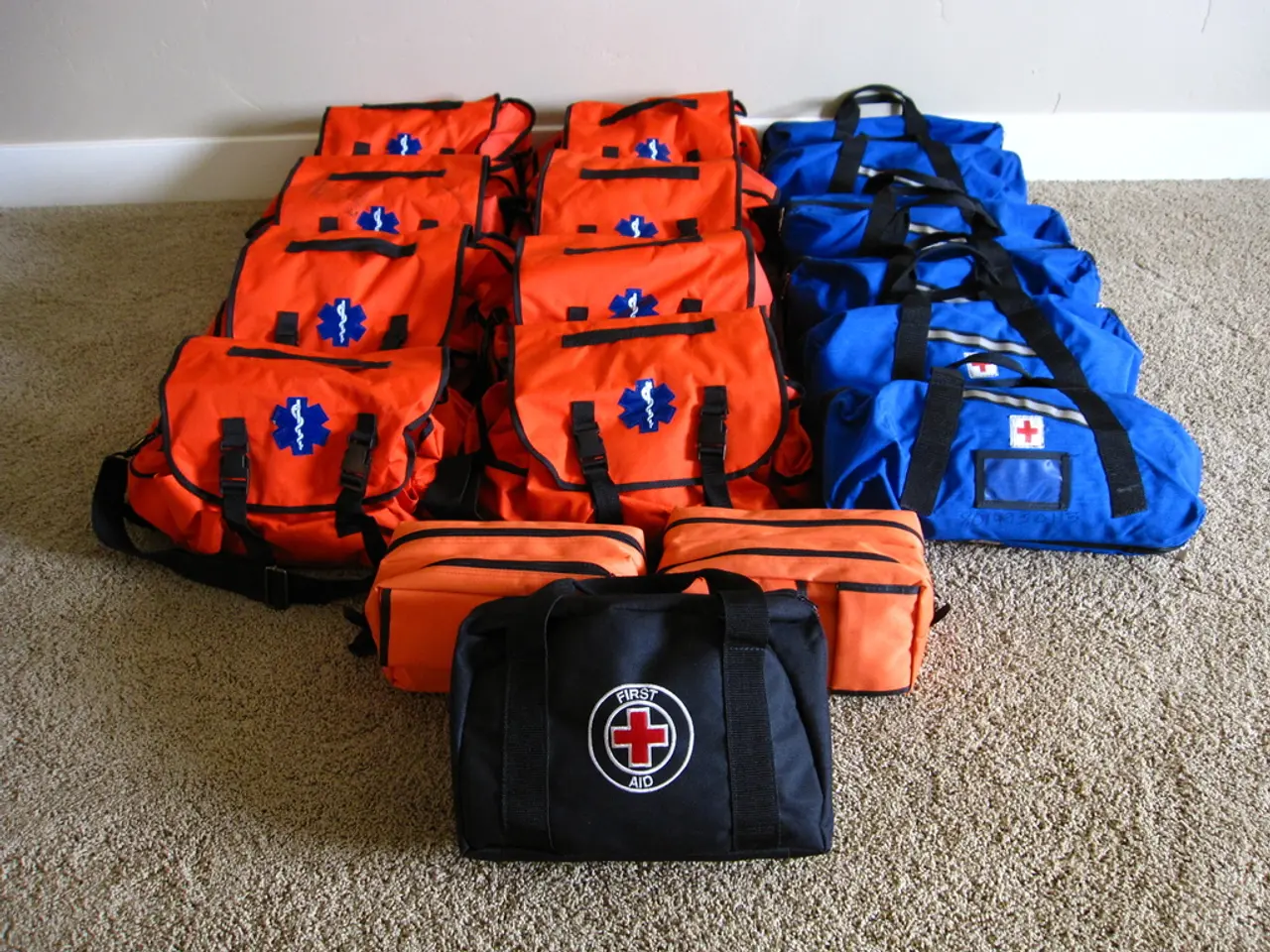Hypertension Categories: Primary, Secondary, Stages, and Further Classifications
Resistant hypertension, a type of high blood pressure that remains uncontrolled despite the use of multiple medications, is a concern for many individuals. This condition, while less common, can lead to serious complications if left untreated.
Causes
Resistant hypertension can be attributed to several factors. Underlying medical conditions such as kidney disease, hormonal disorders, and anatomical abnormalities in blood vessels play a role. Lifestyle factors, including overweight/obesity, high salt intake, excessive alcohol consumption, undiagnosed sleep apnea, and physical inactivity, also contribute. Medication-related issues, like non-adherence to medication, ineffective drug combinations, or suboptimal dosing, should be ruled out. Additionally, secondary hypertension causes, such as renal artery stenosis or endocrine disorders, should be investigated [1][3].
Symptoms
Hypertension often presents without symptoms until complications arise. However, possible nonspecific symptoms include headaches, dizziness, tinnitus, blurred vision, epistaxis, nervousness, fatigue, and sleep disturbances [3]. Resistant hypertension itself may not present distinct symptoms but is suggestive of more serious underlying or secondary causes, and it heightens the risk for damage to organs such as the heart, kidneys, and brain [1][3].
Treatment Options
Addressing resistant hypertension requires a comprehensive, individualized approach. Lifestyle modifications, such as weight reduction, dietary salt restriction, limited alcohol intake, treatment of sleep apnea, and increased physical activity, are critical to improve control [1][3]. Optimized pharmacotherapy, ensuring correct dosing and combination of antihypertensive drugs, including diuretics, ACE inhibitors, calcium channel blockers, beta-blockers, or others as needed, is essential [1][3][5].
Minimally invasive interventions like Renal Denervation (RDN), a catheter-based procedure that disrupts overactive renal sympathetic nerve signals to reduce blood pressure in resistant cases, are also available. This procedure is particularly suitable for patients intolerant to medications or with poor compliance [2][4].
Regular monitoring and evaluation are crucial to exclude pseudo-resistance, confirm adherence, and detect secondary causes [1][5].
Prevalence and Classification
Hypertension, or high blood pressure, is a term used by health professionals to describe a condition where the force of blood against the artery walls is too high. Any blood pressure reading above 130/80 mm Hg classifies as hypertension. The American College of Cardiology (ACC) and the American Heart Association (AHA) revised their guidelines for high blood pressure in 2017 [6].
Secondary hypertension describes high blood pressure that has an identifiable cause or underlying condition. Up to 5-10% of hypertension cases are secondary hypertension, and around 5-10% of people living with hypertension in Western cultures have resistant hypertension [5].
Under the current categories, up to 46% of American adults may qualify as having hypertension. A hypertensive emergency refers to when a person's blood pressure suddenly rises to dangerous levels and can damage essential organs and cause severe complications, such as heart attack, stroke, and loss of kidney function. Hypertensive urgency describes when a person's blood pressure rises to 180/120 mm Hg or more, but they do not yet have symptoms of a hypertensive emergency. Doctors typically treat hypertensive urgency by adjusting a person's medications, but a person should still seek immediate medical attention for hypertensive urgency to prevent it from becoming a hypertensive emergency [6].
It's essential to remember that maintaining a healthy lifestyle, regular check-ups, and adherence to medication are crucial in managing high blood pressure and reducing the risk of complications. If you suspect you may have high blood pressure or resistant hypertension, consult your healthcare provider for a proper diagnosis and treatment plan.
[1] Nishikawa Y, et al. Resistant Hypertension: Pathophysiology and Treatment. Circulation. 2016;133(10):e101-e116. doi:10.1161/CIRCULATIONAHA.115.016565
[2] Benetos A, et al. Renal Denervation for Resistant Hypertension: A Systematic Review and Meta-analysis of Randomized Controlled Trials. J Am Coll Cardiol. 2015;65(11):1131-1141. doi:10.1016/j.jacc.2014.12.021
[3] Whelton PK, et al. 2017 ACC/AHA/AAPA/ABC/ACPM/AGS/APhA/ASH/ASPC/NMA/PCNA Guideline for the Prevention, Detection, Evaluation, and Management of High Blood Pressure in Adults: Executive Summary: A Report of the American College of Cardiology/American Heart Association Task Force on Clinical Practice Guidelines. Hypertension. 2018;71(7):e13-e49. doi:10.1161/HYP.0000000000000065
[4] Lopes RD, et al. Renal Denervation for Resistant Hypertension: A Systematic Review and Meta-analysis of Randomized Controlled Trials. J Am Coll Cardiol. 2015;65(11):1131-1141. doi:10.1016/j.jacc.2014.12.021
[5] Mancia G, et al. 2013 ESH/ESC Guidelines for the Management of Arterial Hypertension: The Task Force for the Management of Arterial Hypertension of the European Society of Hypertension (ESH) and of the European Society of Cardiology (ESC). J Hypertens. 2013;31(7):1281-1359. doi:10.1097/HJH.0b013e328362537d
[6] Whelton PK, et al. 2017 ACC/AHA/AAPA/ABC/ACPM/AGS/APhA/ASH/ASPC/NMA/PCNA Guideline for the Prevention, Detection, Evaluation, and Management of High Blood Pressure in Adults: Executive Summary: A Report of the American College of Cardiology/American Heart Association Task Force on Clinical Practice Guidelines. Hypertension. 2018;71(7):e13-e49. doi:10.1161/HYP.0000000000000065
Read also:
- Is it advisable to utilize your personal health insurance in a publicly-funded medical facility?
- Dietary strategies for IBS elimination: Aims and execution methods
- Benefits, suitable dosage, and safety considerations for utilizing pumpkin seed oil in treating an overactive bladder
- Harmful Medical Remedies: A Misguided Approach to Healing








